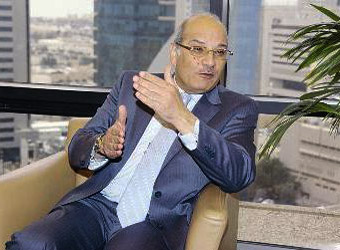UPDATE, July 24: In a surprise move, Morsi has announced water minister Hisham Qandil as his new prime minister.
* * * *
Newly inaugurated Egyptian president Mohammed Morsi is set to announce his pick for prime minister on Wednesday, which will be perhaps the single most important signal yet from the Morsi administration as to how he will govern.![]()
Western media are speculating that it will be none other than Mohamed El-Erian, chief executive officer of Pacific Investment Management Co. The idea that El-Erian would leave PIMCO and return to Egypt after an entire adult life spent abroad to take on an undefined role for a Muslim Brotherhood-backed president whose role is equally undefined is, to say the least, farfetched. Even El-Erian himself appears to have denied the reports.
In contrast, several Egypt-based news sources seem almost certain that the new prime minister will be former Central Bank of Egypt president Mahmoud Abul-Eyoun (shown above), who served as the CBE president from 2001 to 2003 and served as CEO of the Kuwait International Bank until December 2011.
If not Abul-Eyoun, sources have indicated that the prime minister will come from among three additional possibilities, each of whom is an economist: Farouq al-Oqda, the current governor of the Central Bank of Egypt since 2003; Hazem al-Biblawy, a former finance minister; or Osama Saleh, head of the General Authority for Investment.
Those reports make a lot of sense to me:
- Morsi is not an economist, but the biggest challenge for his administration will be to boost Egypt’s sclerotic economy — international reserves have plummeted by half and borrowing costs have risen 50% since Hosni Mubarak was toppled in Febraury 2011 after three decades in power. Unemployment is high, especially among the young, and GDP growth is expected to slow from an already tepid 2.5% in 2011 to just 1.5% this year.
- Morsi has stated that he wants to appoint a cabinet gradually, so as to ensure the seamless nature of the transition.
- If he appoints a Muslim Brotherhood member or an Islamist, it will be instantly divisive , drawing mistrust from Coptic Christians, secularists and liberals, to say nothing of SCAF, the military and the so-called ‘deep state’ elements that remain entrenched in the fabric of Egyptian political power.
- As the former parliamentary leader of the Freedom and Justice Party, the Brotherhood’s political arm, however, Morsi will not want to appoint a prime minister deemed too unacceptable to the Brotherhood.
- If he appoints someone too close to SCAF or Hosni Mubarak’s old regime, he’ll draw criticism from Islamists and secularists alike.
- If he appoints someone too famous (like El-Erian or other well-known figures), he could also risk being overshadowed or outmaneuvered — after all, Morsi’s image in Egypt is of a “spare tire” who was only the Brotherhood’s last-minute choice for the presidency.
So among those four options, Abul-Eyoun seems the most likely. The 75-year-old al-Biblawy served as finance minister recently under the transitional SCAF government, but tried to resign after clases between police and Coptic Christians in October 2011. Morsi may also prefer to keep al-Oqda and Saleh in their current roles, so as not to disrupt Egypt’s economy any further.
That hasn’t stopped rumors like the El-Erian one, nor has it stopped speculation that Mohamed ElBaradei, former head of the International Atomic Energy Agency, might be appointed prime minister, or that the Muslim Brotherhood would prefer Khairat al-Shater, a businessman who was the Muslim Brotherhood’s first choice for the presidential race, until his disqualification in May. Continue reading Forget PIMCO’s Mohamed El-Erian — Egypt’s new PM is likely to be Mahmoud Abul-Eyoun

